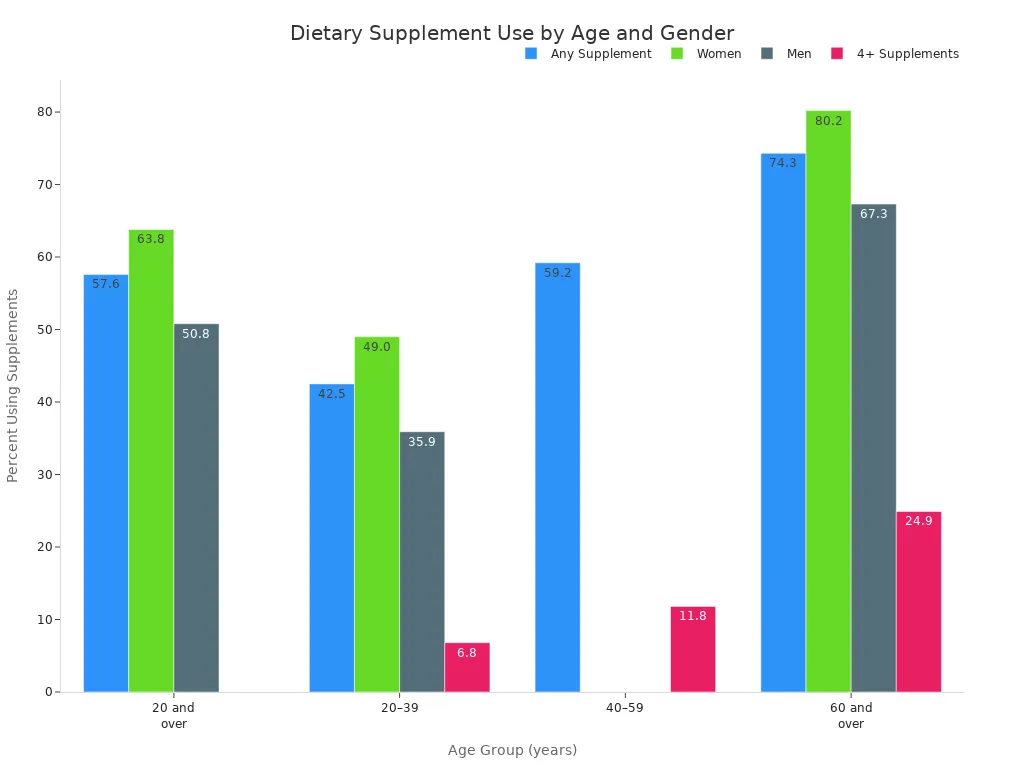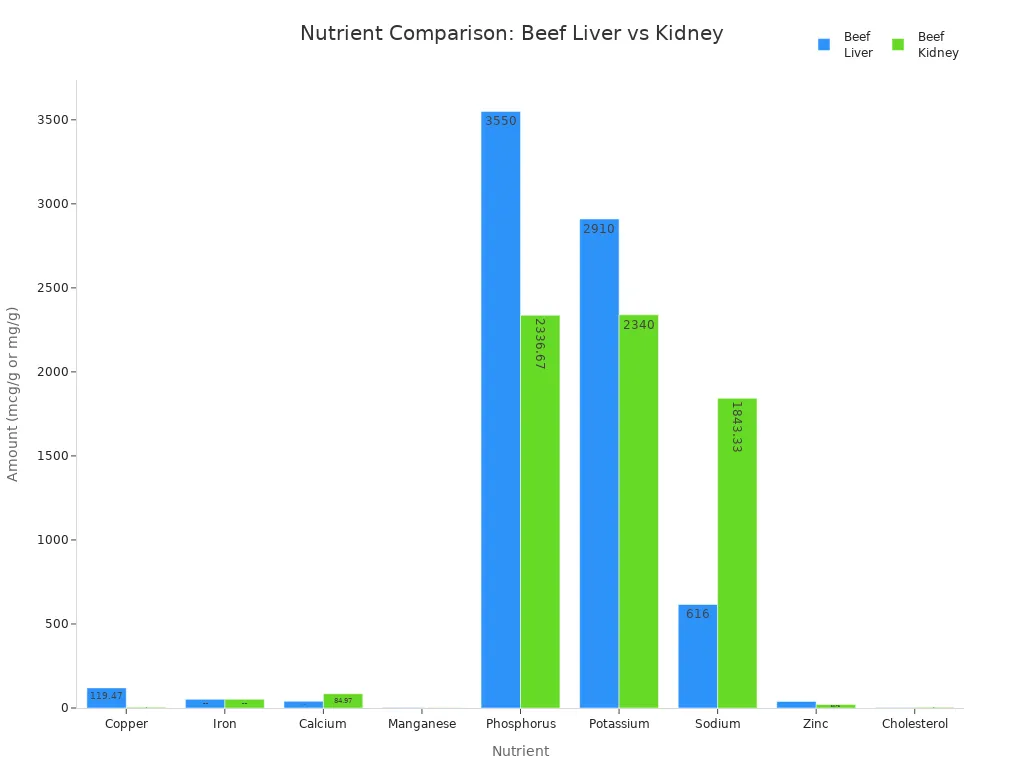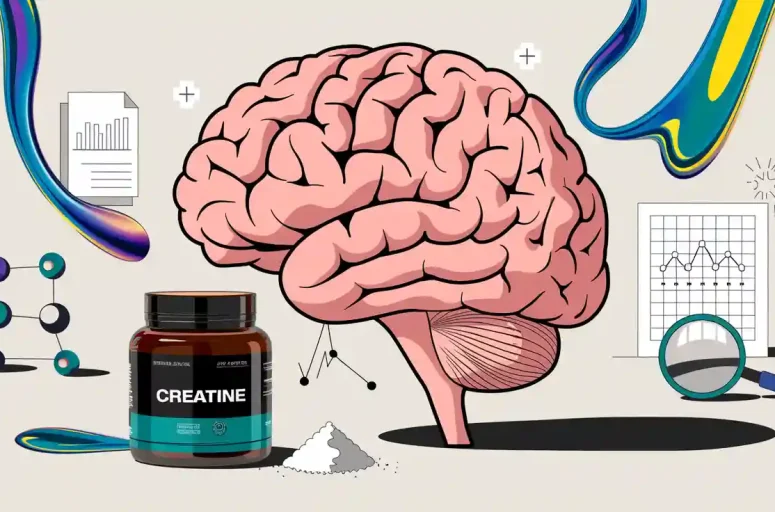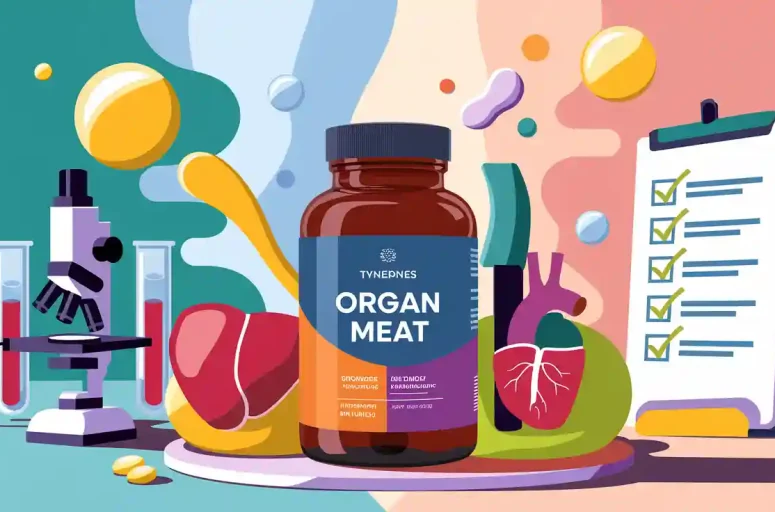
If you want an easy ancestral nutrition solution for complete health, start with beef liver, spleen, and multi-organ blends. These supplements provide essential nutrients like vitamin B12, heme iron, and selenium that support energy, memory, and a balanced diet. Quality matters—choose grass-fed, freeze-dried options and incorporate them into your daily nutrition routine to experience the full benefits of ancestral nutrition.

Medical Disclaimer: This information is for educational purposes only. Consult a healthcare professional before making changes to your supplement or health routines.
Key Takeaways
Grass-fed, freeze-dried beef liver, spleen, and multi-organ blends offer rich nutrients like vitamin B12, iron, and selenium that support energy, memory, and overall health.
Beef liver supplements provide a strong dose of vitamin B12 and iron, ideal for short-term use to quickly correct deficiencies and boost energy.
Multi-organ blends deliver balanced nutrition from several organs, making them safer for daily use with lower vitamin A levels per serving.
Spleen supplements contain heme iron that helps support blood health, but their iron content per serving is lower than fresh meat sources.
Choose supplements without additives, fillers, or preservatives to avoid unwanted side effects and ensure purity and safety.
Start organ supplements slowly, increasing the dose gradually while taking them with meals to improve absorption and reduce side effects.
Capsules offer convenience and mask taste, while powders provide faster absorption and flexible dosing; pick the form that fits your lifestyle.
Trust brands that use transparent sourcing, third-party testing, and ethical marketing to ensure high-quality, safe ancestral nutrition supplements.
Ancestral Nutrition Supplements
Beef Liver
Nutrients
You get a powerful dose of essential nutrients when you choose grass-fed beef liver supplements. Beef liver stands out as nature’s multivitamin, packed with vitamin B12, vitamin A, iron, copper, folate, and choline. The high concentration of vitamin B12 supports energy production and brain function. Iron helps maintain healthy blood and oxygen transport. Copper and folate play key roles in metabolism and cell growth. Choline supports liver and cognitive health.
Here’s a quick comparison of beef liver supplements and multi-organ blends:
Aspect | Beef Liver Supplements | Beef Organ Supplements |
|---|---|---|
Nutrient Concentration | High in vitamin A, B12, iron, copper, folate | Broader spectrum: selenium, CoQ10, natural enzymes |
Nutrient Density | Very nutrient-dense, corrects deficiencies quickly | Balanced intake from multiple organs |
Health Benefits | Supports energy, immunity, brain function | Supports immune, cardiovascular, digestive systems |
Risk Factors | Risk of vitamin A toxicity with long-term use | Lower vitamin A per serving, safer for daily use |
Usage Recommendation | Best for short-term, targeted supplementation | Suitable for consistent, daily use |
Organ Sources | Liver only | Liver, heart, kidney, spleen, pancreas |
Benefits
You may notice several benefits when you add beef liver to your ancestral nutrition routine. The high vitamin B12 content boosts your energy and helps your body fight fatigue. Iron and copper support healthy blood and oxygen delivery, which can improve stamina. Vitamin A and choline promote skin health, vision, and memory. Many people call grass-fed beef liver nature’s multivitamin because it delivers a wide range of nutrients in a wholefood form.
However, you should know that scientific studies do not confirm these benefits for beef liver supplements. Most claims rely on nutrient content and anecdotal reports. No human clinical trials prove that beef liver capsules improve health, athletic performance, or hormone levels. Safety concerns include vitamin A toxicity, heavy metal exposure, and lack of product standardization. You should cycle beef liver supplements and avoid high doses for long periods.
Who Should Use
You may benefit from beef liver supplements if you want to correct vitamin B12 or iron deficiencies quickly. Athletes, busy professionals, and people with low energy often choose beef liver for its nutrient density. If you follow a restrictive diet or avoid organ meats, supplements offer a convenient way to get essential nutrients.
You should consult your healthcare provider before starting beef liver, especially if you are pregnant, breastfeeding, or have liver conditions. Children and people with allergies or gout should use caution. Grass-fed beef liver supplements work best for short-term use or as part of a cycling routine.
Spleen
Iron Intake
Spleen supplements promise to boost iron intake and support blood health. Fresh spleen contains about 44 mg of heme iron per 100 grams, which is highly bioavailable. However, spleen supplements usually provide only 2–3 grams of dried powder per serving, so the iron content is much lower than fresh spleen.
Here’s a comparison of spleen supplements and other animal-based iron sources:
Aspect | Spleen Supplements (Animal-Based) | Other Animal-Based Iron Sources (Meat, Fish, Poultry) |
|---|---|---|
Iron Content | Low per serving (2-3 g dried powder) | High in fresh meat/fish/poultry |
Iron Type | Heme iron, variable and unstandardized | Heme iron, consistently bioavailable |
Bioavailability | Unknown clinical efficacy | Well-established absorption |
Nutrient Synergy | Variable, lacks standardization | Contains B vitamins, zinc, aids absorption |
Clinical Evidence | No trials supporting efficacy | Supported by nutritional research |
Side Effects | Unknown, likely minimal but unproven | Generally well tolerated in food form |
Health Support
You may hear claims that spleen supplements improve immune function and red blood cell production. These claims lack scientific support. No clinical trials show that spleen capsules help immunity or iron status in humans. Theoretical benefits, such as peptides like tuftsin, have not been proven to work in supplement form.
Safety concerns include iron overload and contaminants. The FDA does not regulate these supplements as strictly as medications, so quality varies. You should talk to your doctor before using spleen supplements, especially if you have iron disorders or chronic health conditions.
Multi-Organ Blends
Nutrient Profile
Multi-organ blends combine several organ meats, such as liver, heart, kidney, spleen, and pancreas, into one supplement. You get a broad spectrum of nutrients, including vitamin B12, vitamin A, thiamin, riboflavin, niacin, vitamin B6, pantothenic acid, iron, copper, choline, and probiotics.
The table below shows how these nutrients contribute to your overall nutrition:
Nutrient Category | Specific Nutrients / Components | Contribution to Overall Nutrient Intake |
|---|---|---|
Vitamins | Vitamin A, thiamin, riboflavin, niacin, vitamin B6, vitamin B12, pantothenic acid | Support organ health, immune function, cognitive health, metabolism |
Minerals | Iron, copper | Support blood health, enzymatic functions, metabolism |
Other Nutrients | Choline | Support liver function, brain health, cell membranes |
Probiotics | Bacillus coagulans | Enhance digestive health, gut microbiome, nutrient absorption |
Organ Components | Liver, heart, kidney, adrenal, pancreas, beet root, spirulina, reishi, shilajit | Provide amino acids, enzymes, adaptogens, holistic wellness |
Six Kingdom Approach | Plant, animal, fungi, bacteria, archaea, protist | Broad spectrum, covers modern dietary gaps |
Usage
You can use multi-organ blends for consistent, daily supplementation. These blends offer lower vitamin A per serving than pure beef liver, making them safer for long-term use. You get balanced nutrition from multiple organ meats and wholefood sources.
Clinical studies show that multi-organ blends and multi-vitamin multi-mineral supplements can increase serum vitamin D and β-carotenoids. Most users tolerate these supplements well, with mild side effects like transient gastric reflux that resolve quickly.
Start with one capsule per day and increase gradually to six capsules per day, as recommended by most brands. You should choose grass-fed, freeze-dried, additive-free products for the best results.
Tip: Always consult your healthcare provider before starting any new supplement, especially if you have underlying health conditions or take medications.
Medical Disclaimer: This information is for educational purposes only. It does not constitute medical advice. You should consult a healthcare professional before making changes to your supplement or health routines.
Other Wholefood Options
Supplements made from organ meats offer you a unique way to support your health. You can choose products that feature heart, kidney, or pancreas. Each organ provides distinct nutrients and benefits. Multi-organ blends, such as Dr. Ron’s Ultra-Pure Organ Delight, combine several organ meats from grass-fed animals. These blends deliver pure, bioavailable wholefood nutrition without additives or fillers.
Heart
Heart supplements give you a concentrated source of CoQ10, zinc, and selenium. CoQ10 helps your body produce energy and supports cardiovascular health. Zinc and selenium play important roles in fertility and immune function. You may notice improved stamina and heart function when you add heart organ meats to your routine. Many people use heart supplements to boost their energy and maintain healthy blood pressure.
Kidney
Kidney supplements contain DAO (diamine oxidase), vitamin B12, and selenium. DAO helps your body break down histamine, which can reduce allergy symptoms. Vitamin B12 supports nerve health and energy production. Selenium strengthens your immune system. You may benefit from kidney organ meats if you have histamine intolerance or want to support your immune health. Kidney supplements also provide a rich source of wholefood nutrients.
Pancreas
Pancreas supplements supply digestive enzymes that help your body break down food. These enzymes support gut health and blood sugar balance. You may find pancreas organ meats useful if you want to improve digestion or maintain stable energy levels. Pancreas supplements work well in multi-organ blends, giving you a broad spectrum of nutrients.
Here is a table that summarizes the unique nutrients and health benefits of each organ:
Organ | Unique Nutrients | Health Benefits |
|---|---|---|
Heart | CoQ10, Zinc, Selenium | Supports cardiovascular health and fertility |
Kidney | DAO, Vitamin B12, Selenium | Aids histamine breakdown and immune support |
Pancreas | Digestive enzymes | Supports gut health and blood sugar balance |
Note: Multi-organ blends combine several organ meats to provide a wide range of wholefood nutrients. You get the benefits of heart, kidney, pancreas, and other organs in one supplement.
Medical Disclaimer: This information is for educational purposes only. It does not constitute medical advice. You should consult a healthcare professional before making changes to your supplement or health routines.
Benefits of Vitamin B12
Vitamin B12 plays a vital role in your body’s energy, memory, and heart health. You get this nutrient mainly from animal-based foods, especially organ meats like beef liver and spleen. These supplements offer a convenient way to meet your daily needs and support your overall well-being.
Energy
You rely on vitamin B12 to help your body produce energy. This nutrient supports the formation of red blood cells, which carry oxygen throughout your body. When you have enough B12, your cells can convert carbohydrates, fats, and proteins into fuel more efficiently. If you feel tired or weak, you might want to check for signs of vitamin b12 deficiency. Many people notice improved energy levels after adding beef liver or spleen supplements to their routine. These organ meats contain high amounts of B12, making them a powerful choice for boosting energy. For example, beef liver provides about 59.3 micrograms of vitamin B12 per 100 grams, far more than the recommended daily intake of 4 to 7 micrograms for adults. Even a single serving of Mitchells Nutrition Beef Liver & Spleen Capsules gives you 2.47 micrograms, which is over 100% of your daily requirement.
Tip: If you struggle with fatigue, consider checking your vitamin B12 status and adding a high-quality supplement to your diet.
Memory
Vitamin B12 supports your brain and nervous system. You need this nutrient for healthy nerve cells and proper brain function. Research shows that people with higher B12 levels often perform better on memory and attention tests. Children, teens, and adults all benefit from good B12 status. Low levels can lead to problems with memory, attention, and even social development. Some studies link low B12 to faster cognitive decline and a higher risk of dementia. By choosing organ supplements with high nutrient density, you give your brain the support it needs for learning and memory. Beef liver and spleen supplements make it easy to maintain healthy B12 levels, especially if you do not eat much meat.
Heart Health
Vitamin B12 helps protect your heart by keeping homocysteine levels in check. High homocysteine is a risk factor for heart disease. Organ meats like beef liver and spleen provide not only B12 but also folate and iron, which work together to support cardiovascular health. These nutrients help your body make healthy red blood cells and maintain proper oxygen transport. You also get support for immune health and immune function, thanks to the rich mix of vitamins and minerals in these supplements. Regular use of organ-based supplements can help you maintain a healthy heart and strong immune health.
Supplement | Vitamin B12 per Serving | % of Recommended Daily Intake |
|---|---|---|
Mitchells Nutrition Beef Liver & Spleen Capsules (4 capsules) | 2.47 μg | 123% |
Medical Disclaimer: This information is for informational purposes only and does not constitute medical advice. You should consult a healthcare professional before making any changes to your supplement or health routines.
Iron Intake and Blood Health
Spleen Supplements
You may want to consider spleen supplements if you struggle with low energy or anemia. Spleen is one of the most iron-rich foods available. It contains heme iron, which your body absorbs more efficiently than plant-based sources. Many people use spleen capsules to boost their iron intake, especially if they do not eat much red meat or organ meats. Spleen supplements can help fill nutritional gaps and support healthy blood production. When you choose a high-quality product like Primal Iron, you get a blend of spleen, liver, and other organs for a complete nutrient profile. This formula provides heme iron along with natural cofactors that support absorption and utilization.
Note: Always check with your healthcare provider before starting any new supplement, especially if you have a history of iron overload or chronic health conditions.
Heme Iron
Heme iron comes from animal sources such as beef spleen, liver, and other organ meats. Your body absorbs heme iron at a rate of 15-35%, which is much higher than the 2-20% absorption rate for non-heme iron found in plants. This means you get more benefit from smaller amounts of heme iron compared to plant-based iron-rich foods. Heme iron absorption is less affected by dietary inhibitors like phytic acid or polyphenols, making it a reliable choice for improving iron status. If you rely on plant-based diets, you may need to double your iron intake to match the absorption you get from animal sources. Choosing heme iron from organ supplements can help you maintain healthy iron levels and avoid deficiency.
Iron Source | Absorption Rate | Dietary Inhibitors Affect? |
|---|---|---|
Heme Iron (Animal) | 15-35% | Minimal |
Non-Heme (Plant) | 2-20% | Significant |
Oxygen Transport
Iron plays a vital role in carrying oxygen throughout your body. Heme iron forms the core of hemoglobin, the protein in red blood cells that binds and transports oxygen. Scientific research shows that heme iron’s unique structure allows it to bind oxygen reversibly, supporting efficient oxygen delivery to your tissues. If you do not get enough heme iron, your hemoglobin levels may drop, leading to symptoms like fatigue and weakness. Proper iron intake from iron-rich foods or supplements helps your body maintain healthy oxygen transport and energy production. Primal Iron and similar formulas provide heme iron in a form your body can use right away, supporting both blood health and overall vitality.
Medical Disclaimer: This information is for informational purposes only and does not constitute medical advice. You should consult a healthcare professional before making any changes to your supplement or health routines.
Wholefood Nutrient Sources

Organ Meats
You can boost your nutrition by choosing organ meats as a whole-food supplement. Organ meats like beef liver and kidney stand out as some of the most nutrient-dense foods available. They provide a wide range of vitamins and minerals in forms your body recognizes and absorbs well. This wholefood approach supports nutrient replenishment and helps you fill common dietary gaps.
When you compare beef liver and kidney, you see that both offer high levels of protein and B vitamins, including b12. Beef liver contains much more copper, phosphorus, potassium, and zinc. It also delivers a powerful dose of vitamin b12, making it a top choice for energy and metabolism. Kidney, on the other hand, has more calcium, sodium, and cholesterol. Both organs provide iron in similar amounts, which supports healthy blood and oxygen transport.
Nutrient | Beef Liver (mcg/g or mg/g) | Beef Kidney (mcg/g or mg/g) | Comparison Summary |
|---|---|---|---|
Copper | 119.47 mcg/g | 4.80 mcg/g | Liver has ~25x more copper, providing nearly 600% DV per 100g, exceeding tolerable upper limit |
Iron | 51.53 mcg/g | 52.13 mcg/g | Comparable iron content |
Calcium | 40.23 mcg/g | 84.97 mcg/g | Kidney has over twice the calcium content |
Manganese | 2.60 mcg/g | 1.09 mcg/g | Liver has higher manganese |
Phosphorus | 3550 mcg/g | 2336.67 mcg/g | Liver contains more phosphorus |
Potassium | 2910 mcg/g | 2340 mcg/g | Liver has higher potassium |
Sodium | 616 mcg/g | 1843.33 mcg/g | Kidney has substantially higher sodium |
Zinc | 38.90 mcg/g | 20.73 mcg/g | Liver has nearly double zinc content |
Cholesterol | 2.57 mg/g | 4 mg/g | Kidney has higher cholesterol |

You get a unique nutrient profile from each organ. If you want more vitamin b12 and zinc, beef liver is your best option. If you need extra calcium or sodium, kidney may suit your needs. This variety makes organ meats a strong whole-food alternative to synthetic vitamins.
Collagen
Collagen supplements come from animal connective tissues. You can use collagen to support your skin, joints, and gut health. Collagen provides amino acids like glycine and proline, which help your body build and repair tissues. Many people find that collagen from wholefood sources absorbs better than synthetic forms because it contains natural cofactors. This supports a wholefood approach to wellness.
Tip: Choose grass-fed collagen for the best nutrient density and purity.
Bone Broth
Bone broth is another excellent wholefood supplement. You make bone broth by simmering bones and connective tissue for hours. This process releases minerals, collagen, and amino acids into the broth. Bone broth supports joint health, digestion, and immune function. It also provides b12 and other nutrients in a form your body can use easily. Many people use bone broth as part of a wholefood approach to daily nutrition.
Wholefood supplements contain natural enzymes, fiber, and antioxidants that help your body absorb nutrients.
Synthetic vitamins may lack these cofactors, which can lower their effectiveness and increase the risk of side effects.
Wholefood nutrients support gut health and pose a lower risk of toxicity.
You can rely on nutrient-dense foods like organ meats, collagen, and bone broth for better absorption and overall health. This wholefood approach gives your body the tools it needs for optimal nutrient replenishment.
Medical Disclaimer: This information is for informational purposes only and does not constitute medical advice. You should consult a healthcare professional before making any changes to your supplement or health routines.
Choosing Quality Supplements
Grass-Fed Sourcing
You want the best nutrition from your supplements. Always look for products made from grass-fed beef liver and other organs. Grass-fed sourcing means the animals eat natural diets and roam on pasture. This leads to higher nutrient levels in the organs. You get more vitamins, minerals, and healthy fats compared to grain-fed sources. Grass-fed beef liver contains more omega-3s, vitamin A, and antioxidants. These nutrients support your energy, immune system, and overall health.
When you choose grass-fed beef liver, you also avoid many unwanted chemicals. Pasture-raised animals are less likely to be exposed to antibiotics, hormones, and pesticides. This makes your supplement cleaner and safer. Trusted brands often share details about their farms and animal welfare practices. You can check labels or company websites for this information.
Tip: Look for certifications or third-party testing to confirm grass-fed and pasture-raised claims.
Freeze-Dried Process
The way your supplement is processed affects its quality. Freeze-drying is the gold standard for organ supplements. This gentle, cold process keeps most vitamins and minerals intact. It avoids the high heat used in desiccation, which can destroy sensitive nutrients like vitamin A, B12, and CoQ10. Freeze-dried beef liver capsules keep their natural color, flavor, and nutrient density.
Here are some reasons to choose freeze-dried over desiccated supplements:
Freeze-drying preserves up to 97% of heat-sensitive nutrients.
The process removes most of the taste and smell, making capsules easy to take.
Freeze-dried supplements have a longer shelf life and stay fresh without added preservatives.
A freeze-dried grass-fed beef liver supplement gives you the most potent and bioavailable nutrients. Desiccated products may cost less, but they often lose valuable vitamins and minerals during processing.
Additive-Free
You want your supplement to be as pure as possible. Additives like fillers, binders, preservatives, and colorants can cause problems. Some people react to these ingredients with allergies, digestive upset, or even behavioral changes. Certain preservatives and colorants have links to toxicity and health risks. Fillers such as lactose or oils may trigger intolerances.
Additive-free supplements focus on delivering only the nutrients you need. They avoid unnecessary chemicals and reduce your risk of side effects. Trusted brands use grass-fed beef liver and other organs, freeze-dried without any fillers or artificial ingredients. This ensures you get a clean, effective product.
Additive Type | Potential Risk | Why Avoid? |
|---|---|---|
Fillers | Allergies, digestive issues | Lower nutrient content |
Preservatives | Toxicity, possible carcinogens | Long-term health concerns |
Colorants | Hyperactivity, behavioral issues | Unnecessary chemicals |
Note: Always check the ingredient list. Choose supplements with only the organ meat and capsule material listed.
Medical Disclaimer: This information is for informational purposes only and does not constitute medical advice. You should consult a healthcare professional before making any changes to your supplement or health routines.
Trusted Brands
When you choose an ancestral nutrition supplement, you want to trust the brand behind it. Trusted brands stand out because they follow strict standards and put your health first. You should look for companies that show transparency, use high-quality ingredients, and follow ethical marketing practices.
A reliable brand will share where they source their organs and how they process them. You should see clear information about grass-fed sourcing, freeze-drying, and the absence of additives. Trusted brands also avoid making wild health claims. Instead, they provide honest benefit statements and back up their products with scientific research.
You can use the following table to help identify trusted brands in the ancestral nutrition supplement market:
Criteria | Explanation |
|---|---|
Scientific validation | Uses peer-reviewed research to support ingredient effectiveness. |
Third-party testing & certification | Holds certifications like NSF, USP, or Informed-Choice for independent quality verification. |
Transparency | Shares clear sourcing and manufacturing details, avoids overclaiming benefits. |
Ethical marketing practices | Follows regulations and avoids misleading claims. |
Educational content | Offers resources to help you make informed supplement choices. |
Authentic storytelling | Balances science with relatable stories, building trust without hype. |
Expertise, Authority, Trust (EAT) | Works with credible experts and healthcare professionals. |
Regulatory compliance | Meets DSHEA and FDA guidelines, includes required disclaimers. |
Sustainability credentials | Shows commitment to environmental responsibility and ethical values. |
Consumer engagement | Builds community and trust through social proof and open dialogue. |
You should always check for third-party testing and certifications. These show that the product meets high standards for purity and safety. Look for brands that provide educational content, such as articles, videos, or guides. This helps you understand what you are taking and why it matters.
Brands that work with healthcare professionals and experts show a commitment to quality. They often display credentials or partnerships on their websites. You can also look for customer reviews and community engagement. A brand that listens to feedback and answers questions builds trust over time.
Tip: If a brand hides its sourcing, skips third-party testing, or makes unrealistic promises, consider looking elsewhere.
You deserve supplements that are safe, effective, and honestly marketed. By choosing trusted brands, you protect your health and get the most benefit from ancestral nutrition.
Medical Disclaimer: This information is for informational purposes only and does not constitute medical advice. You should consult a healthcare professional before making any changes to your supplement or health routines.
Daily Use Tips
Dosage
When you start with an organ supplement, begin slowly to help your body adjust. Take 1-2 capsules per day during your first week. After this period, increase your intake by one capsule each day until you reach the recommended dose, which is usually six capsules daily. This gradual approach helps you avoid digestive discomfort and allows your system to adapt. Always take your supplement with food. This practice improves absorption and supports your overall diet. If you notice any side effects, pause or reduce your dosage and consult your healthcare provider.
Tip: Consistency matters more than speed. Give your body time to respond before increasing your dose.
Capsules vs. Powder
You can choose between capsules and powder forms for your organ supplement. Each option has unique benefits and drawbacks.
Capsules
Convenient and easy to carry
Pre-measured doses for accuracy
Masks the taste of organ meats
Longer shelf life
May absorb more slowly
Less flexible with dosing
Powder
Flexible dosing to match your needs
Can mix into drinks or meals
No capsule casing
May have a strong taste or gritty texture
Requires preparation and is less portable
Criteria | Capsules | Powder |
|---|---|---|
Slower | Faster | |
Taste masking | Yes | No |
Convenience & portability | High | Lower |
Dosage flexibility | Fixed | Flexible |
Preparation required | No | Yes |
Choose the form that fits your lifestyle and preferences. If you travel often or dislike the taste of organ meats, capsules may work best. If you want to adjust your dose or mix your supplement into your diet, powder could be a better choice.
Integrating into Meals
You can make your supplement routine easier by linking it to your daily meals. Take your capsules or powder with breakfast or lunch to help your body absorb nutrients. Pair your supplement with healthy fats like avocado or olive oil to boost the absorption of fat-soluble vitamins from beef liver. Add antioxidant-rich foods such as berries or leafy greens to your diet for extra support. If you use powder, mix it into smoothies, soups, or sauces to mask the taste and add nutrition.
Anchor your supplement intake to a regular habit, such as your morning coffee or evening meal.
Use a journal or app to track your supplement use and notice any changes in your health.
Drink plenty of water with your supplement to support digestion and nutrient transport.
Note: Always consult your healthcare provider before starting a new supplement, especially if you have health conditions or take medication.
Medical Disclaimer: This information is for informational purposes only and does not constitute medical advice. You should consult a healthcare professional before making any changes to your supplement or health routines.
Building a Routine
Building a consistent supplement routine helps you get the most benefit from ancestral nutrition. You want to make your supplement intake as easy and automatic as possible. Start by identifying your personal health goals. Think about what you want to achieve, such as boosting energy, improving memory, or supporting heart health. You can use a personalized assessment or quiz to help you decide which supplements fit your needs.
Set up your routine by choosing the right supplement form. Capsules work well for convenience and travel. Powders offer flexibility if you like to mix them into drinks or meals. Pick the option that matches your lifestyle.
Pair your supplement intake with daily habits. You can take your capsules with breakfast or mix powder into your morning smoothie. Linking supplements to existing routines, like brushing your teeth or having coffee, makes it easier to remember. Visual cues help too. Keep your supplements in a visible spot, such as next to your toothbrush or coffee maker.
Use practical tools to stay consistent. Pill organizers keep your doses sorted for the week. Set reminders on your phone or calendar to prompt you each day. Checklists can help you track your progress and make sure you do not miss a dose.
Store your supplements in a cool, dry place. Avoid humidity and direct sunlight to keep them potent. Proper storage protects the nutrients and ensures you get the full benefit.
Monitor your progress over time. Keep a journal to note changes in mood, energy, or overall health. You can use blood tests to track nutrient levels if you want objective feedback. Regular check-ins with a healthcare professional help you interpret results and adjust your routine as needed.
Pay attention to timing and interactions. Take fat-soluble vitamins with meals that contain healthy fats. Space out supplements that might interact negatively. Avoid taking too many supplements at once, and do not neglect a balanced diet.
Here is a simple checklist to help you build your routine:
Identify your health goals.
Choose supplement forms that fit your lifestyle.
Pair intake with daily habits.
Use reminders and organizers.
Store supplements properly.
Track your progress.
Consult your healthcare provider.
Adjust timing and avoid negative interactions.
Maintain a balanced diet.
Consistency is key. You may not see results right away, but sticking to your routine gives your body time to respond and benefit from ancestral nutrition.
Medical Disclaimer: This information is for informational purposes only and does not constitute medical advice. You should consult a healthcare professional before making any changes to your supplement or health routines.
Addressing Concerns
Taste
You may notice a strong or unfamiliar taste when you first try organ supplements. The bitterness comes from natural vitamins like D, B6, and B9. These vitamins activate bitter taste receptors on your tongue, which can cause an off-flavor or aftertaste. Scientific studies show that these nutrients trigger specific receptors, making the taste more noticeable. If you find the flavor challenging, start with a low dose and increase gradually. This slow approach helps your body adjust and reduces discomfort. Freeze-dried organ supplements taste like real food, which may be new to you. Drinking plenty of water and getting enough rest can help during the adjustment period. If you are sensitive to histamines, freeze-dried products have lower histamine levels, making them easier to tolerate. Over time, most people get used to the taste and find it manageable.
Tip: Mix powder supplements into smoothies or sauces to mask the flavor. Capsules are a good choice if you want to avoid the taste altogether.
Safety
You want to feel confident about the safety of your supplement. Organ supplements provide concentrated nutrients such as vitamins A, B12, D, iron, and zinc. Most side effects are mild and come from taking too much of these nutrients. You may experience symptoms like headaches, nausea, or skin changes if you exceed recommended doses. Some people notice detox-like effects when they start, which means the body is removing toxins, not having an allergic reaction. Allergies to beef are rare but possible, so avoid these supplements if you have a known allergy. High doses of vitamin B6 can cause nerve problems or sensitivity to sunlight. Too much vitamin E may lead to bleeding, weakness, or vision changes. Most people in developed countries do not need extra vitamins unless they have a deficiency. Always follow dosing instructions and consult your healthcare provider before starting a new supplement.
Common safety tips:
Start with a low dose and increase slowly.
Watch for signs of nutrient overload.
Avoid if you have beef allergies.
Consult your doctor if you have health conditions.
Suitability
You may wonder if organ supplements are right for you or your family. These products suit many people, including women, children, and those with special diets. Supplement programs often target pregnant and breastfeeding women, adolescents, and households through clinics, schools, and community centers. Pregnant and lactating women need extra nutrients like iron, vitamin D, and B12 to support their health and their babies’ development. School-based programs help adolescent girls reduce anemia. If you follow a plant-based diet, you may lack nutrients such as omega-3s, vitamins A, D, B12, zinc, and choline. Proper supplementation supports brain and bone health, especially during pregnancy and breastfeeding. Dietitians can help you create a plan that meets your needs. Delivery methods vary, so you can choose capsules, powders, or blends that fit your lifestyle.
Note: Always talk to your healthcare provider before giving supplements to children or using them during pregnancy or breastfeeding.
Medical Disclaimer: This information is for informational purposes only and does not constitute medical advice. You should consult a healthcare professional before making any changes to your supplement or health routines.
Allergies
You may wonder if organ supplements could trigger allergies. Most people tolerate these products well, but some ingredients can cause reactions. You should know the most common allergens found in organ supplements. These include gelatin, rennet, dairy products (especially high-fat dairy like butter and ice cream), carrageenan, and mammalian-derived ingredients such as lanolin and vitamin D3 from sheep’s wool.
If you have a history of allergies, you need to check supplement labels carefully. Gelatin, often used in capsules, comes from beef or pork. Rennet, found in some dairy-based supplements, can also cause problems. Carrageenan, a thickener, sometimes appears in gummy supplements or capsules. Lanolin and vitamin D3 from sheep’s wool may trigger reactions in sensitive individuals.
You can assess your tolerance by following a stepwise elimination approach. Start by removing moderate-risk foods and products from your diet. Many people begin with cheeses and dairy made with rennet. Next, eliminate other high-fat dairy, then lower-fat dairy, gelatin, carrageenan, and natural flavorings from beef or pork. Watch for symptoms such as hives, swelling, stomach pain, or breathing difficulties.
Here is a simple checklist to help you identify and manage potential allergens:
Read supplement labels for gelatin, rennet, dairy, carrageenan, lanolin, and animal-derived vitamin D3.
Eliminate one category at a time and monitor your symptoms.
Watch for cross-contamination at home and when eating out.
Be cautious with poultry or seafood treated with mammalian byproducts.
Avoid gummy supplements if you react to gelatin.
Ask your healthcare provider about gelatin-free or vegan alternatives.
Consider switching to vegan vitamin D3 from lichens if you react to sheep’s wool.
Use resources like the DailyMed database to check for hidden animal ingredients in medications and supplements.
Tip: Everyone reacts differently. Take your time and track your symptoms to find your personal triggers.
You should always consult your healthcare provider before starting any new supplement, especially if you have known allergies or sensitivities. They can help you choose safe options and guide you through the elimination process.
Medical Disclaimer: This information is for informational purposes only and does not constitute medical advice. You should consult a healthcare professional before making any changes to your supplement or health routines.
Success Stories
Case Studies
You can see the impact of ancestral nutrition supplements through real-life examples. Ancient Nutrition, founded by Dr. Josh Axe, shows how combining ancestral wisdom with modern science leads to noticeable health improvements. The company uses clinically studied collagen peptides and fermented superfoods. Customers report better energy, stronger joints, and improved digestion after using these products. Ancient Nutrition focuses on regenerative farming and ritual-ready formulas. This approach helps you get consistent results. Many users share stories of transformation, such as feeling more alert or experiencing fewer aches. The brand’s clinical validation and customer feedback highlight the effectiveness of ancestral nutrition for daily wellness.
Testimonials
You might find inspiration in the words of people who have tried ancestral nutrition supplements. Here are a few examples:
“I started taking beef liver capsules every morning. My energy levels went up, and I felt less tired during the day.”
“After adding multi-organ blends to my routine, my digestion improved. I noticed less bloating and more regularity.”
“The collagen supplement helped my joints. I can exercise longer without discomfort.”
“I was skeptical at first, but after a month, my skin looked healthier and my nails grew stronger.”
Many users say they feel more balanced and resilient. You may notice small changes at first, but these can add up over time.
Expert Tips
You can maximize the benefits of ancestral nutrition supplements by following advice from health professionals:
Start with a low dose and increase gradually.
Choose grass-fed, freeze-dried products for higher nutrient quality.
Pair supplements with meals that contain healthy fats to boost absorption.
Track your progress in a journal to see what works best for you.
Consult a healthcare provider before starting any new supplement, especially if you have health conditions.
Tip | Why It Matters |
|---|---|
Start slow | Helps your body adjust |
Quality sourcing | Ensures maximum nutrient density |
Pair with meals | Improves vitamin absorption |
Track progress | Lets you see real changes |
Consult provider | Keeps your routine safe and effective |
Remember, consistency is key. You may not see results right away, but steady use supports long-term health.
Medical Disclaimer: This information is for informational purposes only and does not constitute medical advice. You should consult a healthcare professional before making any changes to your supplement or health routines.
You can support your health with ancestral nutrition supplements by following these steps:
Choose grass-fed, freeze-dried, additive-free products.
Start with a low dose and increase slowly.
Stay consistent with your routine for best results.
You can begin today or improve your current supplement plan. Quality and patience help you see benefits over time.
Medical Disclaimer: This information is for educational purposes only. You should consult a healthcare professional before making changes to your supplement or health routines.
FAQ
What is the best time to take organ supplements?
You can take organ supplements with meals. This helps your body absorb fat-soluble vitamins. Many people prefer breakfast or lunch. Try to take them at the same time each day for best results.
Can you take organ supplements if you follow a special diet?
Yes, most organ supplements fit many diets, including paleo and keto. If you avoid animal products, these may not suit you. Always check the label for allergens or added ingredients.
How long does it take to notice benefits?
You may start to feel changes in energy or digestion within two to four weeks. Results vary for each person. Track your progress in a journal to see improvements over time.
Are organ supplements safe for children?
Children can use organ supplements, but you should talk to a pediatrician first. Dosage and safety depend on age and health needs. Never give adult doses to children.
Can you take organ supplements with other vitamins?
You can combine organ supplements with other vitamins, but avoid doubling up on nutrients like vitamin A or iron. Too much can cause side effects. Check with your healthcare provider for guidance.
What should you do if you experience side effects?
If you notice nausea, headaches, or stomach upset, lower your dose or stop taking the supplement. Drink water and rest. If symptoms continue, contact your doctor.
Medical Disclaimer: This information is for informational purposes only. You should consult a healthcare professional before making any changes to your supplement or health routines.


